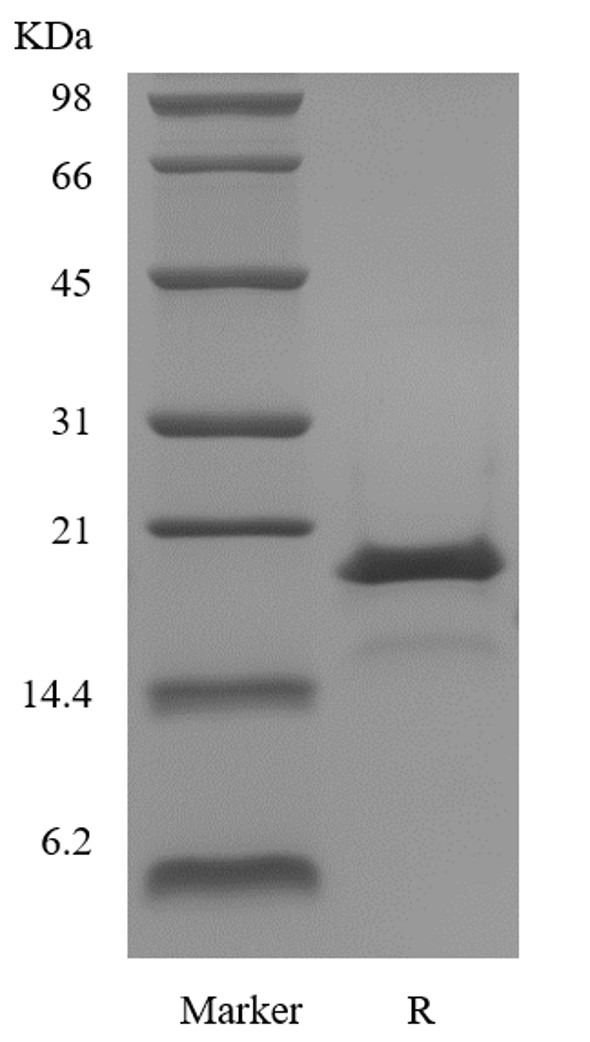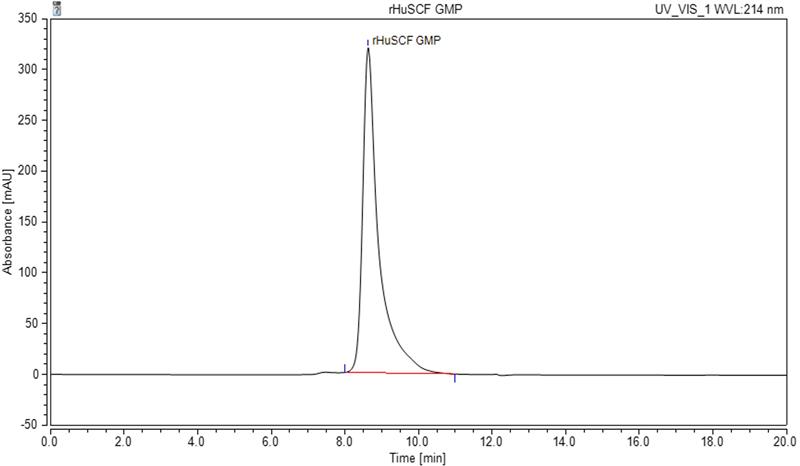- Source
- Escherichia coli
- Molecular Weight
- Approximately 18.5 kDa, a single non-glycosylated polypeptide chain containing 164 amino acids.
- Sequence
- EGICRNRVTN NVKDVTKLVA NLPKDYMITL KYVPGMDVLP SHCWISEMVV QLSDSLTDLL DKFSNISEGL SNYSIIDKLV NIVDDLVECV KENSSKDLKK SFKSPEPRLF TPEEFFRIFN RSIDAFKDFV VASETSDCVV SSTLSPEKDS RVSVTKPFML PPVA
- Purity
- > 98% by SDS-PAGE and HPLC analyses.
- Biological Activity
- Fully biologically active when compared to standard. The ED50 as determined by a cell proliferation assay using human MO7e cells is less than 10 ng/mL, corresponding to a specific activity of > 5.0 × 105 Units/mg, which is calibrated against rHuSCF WHO reference reagent (NIBSC code: 91/682).
- Physical Appearance
- Sterile filtered white lyophilized (freeze-dried) powder.
- Formulation
- Lyophilized from a 0.2 μm filtered concentrated solution in PBS, pH 7.0.
- Endotoxin
- Less than 0.01 EU/μg of rHuSCF GMP as determined by LAL method.
- Sterility
- Negative.
- Mycoplasma
- Negative.
- Host Cell Protein
- Less than 0.05% when tested by ELISA.
- Host Cell DNA
- Less than 20 ng/mg when tested by qPCR.
- In Vitro Virus Assay
- Negative.
- Reconstitution
- Prior to opening, it is recommended to centrifuge the vial briefly to bring the contents down the bottom. Reconstitute in sterile distilled water or aqueous buffer containing 0.1% BSA to a concentration of 0.1-1.0 mg/mL. If animal-origin-free condition is expected in your product, then sterile distilled water is recommended. Stock solutions should be apportioned into working aliquots and stored at ≤ -20 °C. Further dilutions should be made in appropriate buffered solutions.
- Shipping
- The product is shipped with polar packs. Upon receipt, store it immediately at the temperature recommended below.
- Stability & Storage
- Use a manual defrost freezer and avoid repeated freeze-thaw cycles.
- A minimum of 12 months from date of receipt, when stored at ≤ -20 °C as supplied.
- 1 month, 2 to 8 °C under sterile conditions after reconstitution.
- 3 months, -20 to -70 °C under sterile conditions after reconstitution.
- Refer to lot-specific CoA for the Expiry Date.
- Usage
- This material is offered by Shanghai PrimeGene Bio-Tech for research, laboratory, or further evaluation purposes. NOT FOR HUMAN USE.
- Quality Statement
- The manufacturing and testing of these products comply with ICH Q7 guidelines.
- Background
- Stem Cell Factor (SCF) that binds to the c-Kit receptor is produced by fibroblasts and endothelial cells. The soluble and transmembrane forms of the protein are formed by alternative splicing of the same RNA transcript and the presence of both soluble and transmembrane SCF is required for normal hematopoietic function. SCF plays an important role in hematopoiesis, spermatogenesis, and melanogenesis. It also promotes mast cell adhesion, migration, proliferation, and survival. Human SCF shares 79% - 87% a.a. sequence identity with canine, feline, mouse, and rat SCF. Furthermore, human SCF is weakly active on mouse cells.









 COA Application
COA Application


